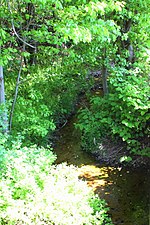Nanticoke, Pennsylvania
1800 establishments in PennsylvaniaCities in Luzerne County, PennsylvaniaCities in PennsylvaniaNortheastern PennsylvaniaPages containing links to subscription-only content ... and 4 more
Pennsylvania populated places on the Susquehanna RiverPolish-American culture in PennsylvaniaPopulated places established in 1800Use mdy dates from July 2023

Nanticoke is a city in Luzerne County, Pennsylvania, United States. As of the 2020 census, the population was 10,628, making it the third largest city in Luzerne County. It occupies 3.6 square miles (9.3 km2) of land. Nanticoke is part of Northeastern Pennsylvania. The city can be divided into several sections: Honey Pot (northwestern Nanticoke), (northern and central Nanticoke), and Hanover Section (southeastern Nanticoke). It was once an active coal mining community. Today, the 167-acre main campus of Luzerne County Community College is located within the city.
Excerpt from the Wikipedia article Nanticoke, Pennsylvania (License: CC BY-SA 3.0, Authors, Images).Nanticoke, Pennsylvania
East Ridge Street,
Geographical coordinates (GPS) Address Nearby Places Show on map
Geographical coordinates (GPS)
| Latitude | Longitude |
|---|---|
| N 41.199444444444 ° | E -75.999166666667 ° |
Address
East Ridge Street 151
18634
Pennsylvania, United States
Open on Google Maps



